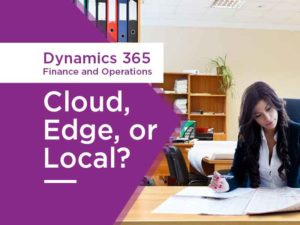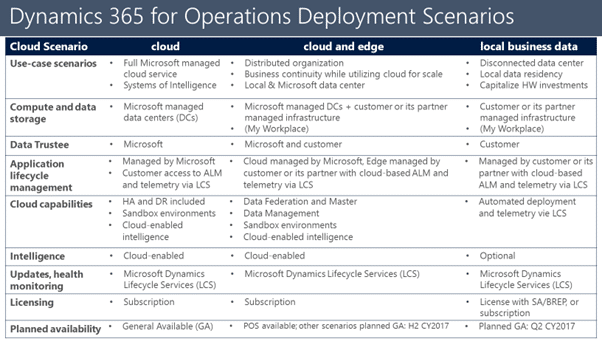
|
|
#1 |
|
Участник
|
powerobjects: Cloud, Edge, or Local? Dynamics 365 Finance and Operations Deployment Options
Источник: https://www.powerobjects.com/2017/12...yment-options/
==============  In today’s blog on Dynamics 365 for Finance and Operations, we are going to touch on different deployment scenarios that are available for customers. When choosing a Microsoft Dynamics 365 for Finance and Operations deployment, there are three options: Cloud, Cloud and Edge (hybrid), or Local Business Data (on-premises). The option you choose will depend on your business need. One great feature is that you have the option to change up your deployment down the line. Why would you do that? Well, maybe you recently made a large infrastructure investment but still want to implement Dynamics 365. You could start with a Local implementation and then switch over to the Cloud at the end of that hardware’s life cycle. How great is that? Now let’s move on to learning more about each of the deployment options (we’ll use Microsoft’s descriptions of each type and explain what they mean). Cloud This scenario offers a fully Microsoft managed cloud ERP service that includes high availability (H/A), disaster recovery (D/R), sandbox environments, and application life cycle management that are combined with cloud-based systems of intelligence, infrastructure, compute, and database services in a single offering. What does this mean? It means that your Dynamics 365 deployment lives in Microsoft’s Cloud and is fully managed by them, so Microsoft is the Data Trustee in this scenario. This covers your high availability and disaster recovery using geo-redundant data centers. This option has the tightest integration with the Azure stack offerings like BI, Machine Learning, Logic Apps, etc. Microsoft is taking a Cloud first approach so some new functionality around infrastructure tie ins (SQL) will likely appear here first. Why would you consider this deployment type? There are some great benefits with this option. You get “always on” infrastructure without having to staff it and you get the disaster recovery (D/R) and high availability (H/A) without the additional hardware investments. One of the biggest advantages of this option is scalability. You can scale up when needed and without an additional hardware investment. You are paying for user licensing and not the computing power or “hardware.” Need to add a new division and need additional AOS resources or SQL processing power? You can scale up with a service request. Cloud and Edge A primarily cloud-based scenario that combines the power of a Microsoft managed Cloud service with plans to enable organizations to run their business processes from application servers at the edges. This means that transactions are supported by local application services and business data is stored locally. What does this mean? It means that this is a hybrid of Cloud and On-Premises deployments. Transactions are entered via local applications and the data is stored locally in the customer’s data center. There is also a central Cloud node which provides a single view of the business data and provides failover to the Cloud – D/R and H/A. Since it is still using the Cloud, you can still take advantage of BI, Machine Learning, etc. without a lot of manual configuration. Why would you consider this deployment type? Some organizations, like Retail or Manufacturing, may require things to be local for business continuity. For example, a retailer must be able to run the store POS operations even if internet connectivity goes down for a few seconds or minutes. This way you can capture the transactions locally and sync back up when you’re back online and don’t have to worry about redundant internet connectivity at the store level. In this scenario, both the customer and Microsoft are considered the data trustee. Local Business Data A scenario that will allow customers to deploy a Dynamics 365 for Finance and Operations environment into their or their partner’s data center and run operations without replicating business data to the Cloud. What does this mean? This one is fairly self-explanatory. The customer deploys all the Dynamics 365 components in their own data center. None of the applications or data reside in the Cloud. The customer is the data trustee, responsible for H/A and D/R, and for maintaining all the servers in the data center. Since there isn’t integration to the Cloud, options for things like integrated BI and Machine Learning are not available or require some additional configuration. Configuring all applications does require some heavy lifting from your IT staff and there are some serious system requirements. Why would you consider this deployment type? Some organizations are just not ready or comfortable with their mission critical data and apps residing in the Cloud. Or maybe you just spent a ton of money on recent hardware improvements and want to take advantage of that. Some industry mandates may require full access and control to the infrastructure or data. Maybe internet connectivity is an issue and there aren’t many options for redundant connections. Here is a matrix that outlines the options and provides some details on each. Please note that the image is now a bit out dated and all the options are currently available.  Clearly, there is a lot of to consider when making your decisions on a Dynamics 365 for Finance and Operations deployment type. The good news is that there are options and you can choose to go one route in the beginning and then change directions downstream if you want! Learn more about Dynamics 365 for Finance and Operations in our on-demand webinar series! Learn how PowerObjects can help you on your Dynamics 365 journey here. Happy Dynamics 365’ing! Источник: https://www.powerobjects.com/2017/12...yment-options/
__________________
Расскажите о новых и интересных блогах по Microsoft Dynamics, напишите личное сообщение администратору. |
|
|
|
|
|